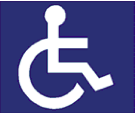 The image conjured up of someone disabled is a person in a wheel chair having trouble with mobility, right? There are many types of disability, mental, physical, spiritual and emotional. With disability often comes pain and suffering. From pain and suffering can spring addiction.
The image conjured up of someone disabled is a person in a wheel chair having trouble with mobility, right? There are many types of disability, mental, physical, spiritual and emotional. With disability often comes pain and suffering. From pain and suffering can spring addiction.
Whether a disability stems from an accident or a medical condition, such as multiple sclerosis or a serious mental health disorder, it often has a serious and negative impact on a person’s emotional well-being. In some individuals, that impact leads to the abuse of alcohol or drugs. Some want to numb the physical and /or emotional pain and sense of loss, while others struggle to distract themselves from having too much time on their hands As reported in www.addictiontreatmentmagazine.com.
It’s been estimated that over 50 million Americans live with some type of disability. While that statistic includes those born with a mental or physical impairment, it also encompasses those who become disabled at some point during their lifetime. Individuals with disabilities have a substance abuse rate 2 to 4 times that of the non-disabled population, according to the Department of Health and Human Services.
It’s estimated that as many as half of those with an orthopedic disability, spinal cord injury, amputation, or vision impairment can be classified as heavy drinkers. Additionally, arthritis sufferers and those with multiple sclerosis have high rates of drug and alcohol abuse – nearly double the rate of the general population.
This is the first in a series of blogs looking at disability and addiction issues. If you or someone you care about is suffering from a disability and may also have addiction issues, I urge you to seek help immediately. A drug class is a place to start. If you prefer to maintain anonymity, there are online drug classes too.
